No new economic sanctions were decided by the European Foreign Ministers, who met yesterday to discuss the latest escalation of violence in Ukraine.
According to statements by Dutch Foreign Minister Bert Koenders, at a press conference after the meeting, existing sanctions were extended by six months while there was no reference to adding Russian nationals in lists of individual sanctions.
Koenders characterized this decision as “a clear message to Russia,” although several European countries leaders believe that an extension of sanctions is not enough and that more pressure must be put on Russia to stop its alleged involvement in the Ukrainian crisis.
On his part, newly appointed Foreign Minister Nikos Kotzias said on Thursday after the talks in Brussels that the council ended with a mutually satisfying compromise for the EU and Greece.
Specifically, Kotzias noted that a final document signed by the Foreign ministers was changed thanks to Greece’s efforts and that it reflects to a large extent the government’s positions. For example, the declaration calls on all sides to assume the responsibility for their actions, while Russia is mentioned only in relation with the condemnation of separatists and their actions.
Ministers also removed from the final document the point about the need to address Russian propaganda and added a reference to the protection of national minorities, including the Greek community in Ukraine.
With regard to sanctions, Kotzias sai he explained to his counterparts that this kind of measures are not effective, as it has been proven in a number of countries, like Iran and Cuba.
EU Foreign Affairs Federica Mogherini said that at the Council, Greece’s stance was constructive and focused on protecting the EU’s unity. She said that the “particularly positive stance” of Greece contributed to the reaching of a compromise solution that was substantial and acceptable.
Ask me anything
Explore related questions





